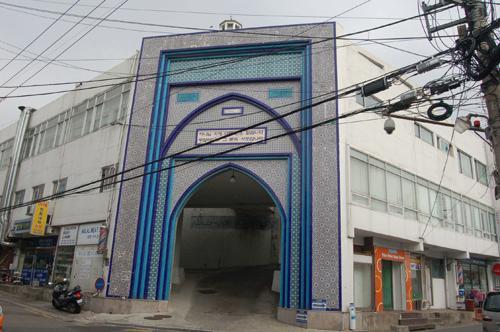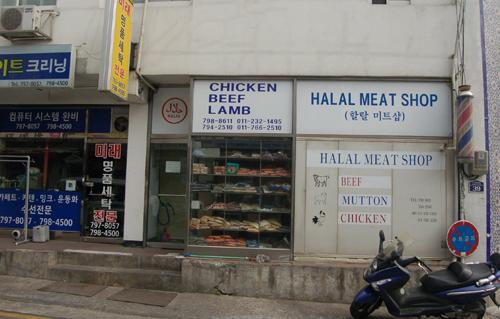Small but diverse, Muslim community carries on its worship
By Korea HeraldPublished : April 15, 2012 - 20:12

Shariq Saeed carries an unconventional status symbol with him everywhere he goes: a calloused indentation on his forehead. The weathered bump, called a zabiba, was caused by friction between his head and a prayer mat.
Muslims are instructed to pray five times a day, and a zabiba is generally viewed as a sign of piety and devotion caused by deep, repeated bows.
Saeed is a nine-year resident of Seoul from Pafkistan, and a practicing Muslim. The scar tissue on his forehead is evidence of dedication to his religion, a faith he brought him to Korea, where he continues to worship among his fellow Muslims at Seoul Central Mosque in Itaewon, downtown Seoul.
Each Friday afternoon, Saeed is one of the worshippers who answer the call to prayer that rings out from Seoul Central Mosque.
South Korea’s Muslim population, believed to number around 35,000, is far smaller than its large Christian and Buddhist populations, but Seoul Central Mosque is still filled with worshippers each week. The mosque is located near a popular nightlife area; worshippers walk past night clubs and transvestite bars on their way to prayers.
Muslims everywhere need to reconcile their faith with violent passages in its scripture and images of terror seen in media reports. “There is a true face of Islam, but it is not seen in the media,” Saeed said. “The true Islam is what we see around us here: brothers sharing in peace.”
Seoul Central Mosque is the largest mosque in Korea and was built in 1974 with petro dollar support from Saudi Arabia. On the mosque’s faded facade is letter in the graceful script of Arabic.
Worshippers leave their shoes on the steep, wide staircase that leads to the prayer room.
The mosque is an imposing structure at the top of a hill.
Flanked by twin minarets, the white building stands out in the grayness of Seoul. The area above the entrance is decorated with intricate blue tiles. The Islamic discouragement of the drawing of human figures, a restriction meant to prevent idolatry, led to creative use of tiles to decorate houses of worship.
Islam doesn’t have an extensive history in Korea but has found a following of Korean converts to Islam and foreign residents.
Seoul’s Muslim population illustrates the diversity of Islam.
The community formed around Seoul Central Mosque is made up of worshippers from the Middle East, South and Southeast Asia, and Africa. Each of these locations has its own regional variation of Islam, but all find common ground in the worship of Allah.
Indonesians form the largest foreign group.
Many congregants at the mosque described seeking guidance from Islam in their daily lives. “Through research I discovered that Islam is a true religion. It helps me to be obedient, to love and be caring of others,” said Varney, an engineering student from Liberia, a small, Christian-majority country in West Africa.
Jeon Seung-joon, like other Korean Muslims, has a unique story of discovering Islam and converting. He found Islam in Ireland, of all places. While studying there, he made friends with Muslims and was drawn to Islamic principles.
“Once I became a Muslim, I felt purified,” he said.
At first his new faith was a source of conflict with his family. “They felt like I was betraying them,” he said. Over time, his friends and family have come to accept his conversion, though he says there are complications to living as a Muslim in Korea.
“Food is very difficult, because I love meat but can only eat halal products.”
Muslims are instructed to pray five times a day, and a zabiba is generally viewed as a sign of piety and devotion caused by deep, repeated bows.
Saeed is a nine-year resident of Seoul from Pafkistan, and a practicing Muslim. The scar tissue on his forehead is evidence of dedication to his religion, a faith he brought him to Korea, where he continues to worship among his fellow Muslims at Seoul Central Mosque in Itaewon, downtown Seoul.
Each Friday afternoon, Saeed is one of the worshippers who answer the call to prayer that rings out from Seoul Central Mosque.
South Korea’s Muslim population, believed to number around 35,000, is far smaller than its large Christian and Buddhist populations, but Seoul Central Mosque is still filled with worshippers each week. The mosque is located near a popular nightlife area; worshippers walk past night clubs and transvestite bars on their way to prayers.
Muslims everywhere need to reconcile their faith with violent passages in its scripture and images of terror seen in media reports. “There is a true face of Islam, but it is not seen in the media,” Saeed said. “The true Islam is what we see around us here: brothers sharing in peace.”
Seoul Central Mosque is the largest mosque in Korea and was built in 1974 with petro dollar support from Saudi Arabia. On the mosque’s faded facade is letter in the graceful script of Arabic.
Worshippers leave their shoes on the steep, wide staircase that leads to the prayer room.
The mosque is an imposing structure at the top of a hill.
Flanked by twin minarets, the white building stands out in the grayness of Seoul. The area above the entrance is decorated with intricate blue tiles. The Islamic discouragement of the drawing of human figures, a restriction meant to prevent idolatry, led to creative use of tiles to decorate houses of worship.
Islam doesn’t have an extensive history in Korea but has found a following of Korean converts to Islam and foreign residents.
Seoul’s Muslim population illustrates the diversity of Islam.
The community formed around Seoul Central Mosque is made up of worshippers from the Middle East, South and Southeast Asia, and Africa. Each of these locations has its own regional variation of Islam, but all find common ground in the worship of Allah.
Indonesians form the largest foreign group.
Many congregants at the mosque described seeking guidance from Islam in their daily lives. “Through research I discovered that Islam is a true religion. It helps me to be obedient, to love and be caring of others,” said Varney, an engineering student from Liberia, a small, Christian-majority country in West Africa.
Jeon Seung-joon, like other Korean Muslims, has a unique story of discovering Islam and converting. He found Islam in Ireland, of all places. While studying there, he made friends with Muslims and was drawn to Islamic principles.
“Once I became a Muslim, I felt purified,” he said.
At first his new faith was a source of conflict with his family. “They felt like I was betraying them,” he said. Over time, his friends and family have come to accept his conversion, though he says there are complications to living as a Muslim in Korea.
“Food is very difficult, because I love meat but can only eat halal products.”

Halal is an Arabic word meaning “lawful” or “permitted.” Pork is forbidden by Islamic teachings and all other meats must be from animals slaughtered according to halal principles. This entails slicing the animal’s throat while its heart is still beating, so as to drain much of the animal’s blood as possible. This is done in Allah’s name.
The sentiment about difficulties of practicing Islam in Korea is echoed by foreigners who have come to Korea from Muslim-majority countries. “In Malaysia we have many mosques, but in Seoul there is only one mosque,” said Mohd Fakrul, an exchange student from Malaysia.
“If we need to pray in the middle of the day, it can be difficult to find a proper place.”
But life abroad as a Muslim also brings opportunity to move deeper in the faith and share it with Koreans, who are generally unfamiliar with Islam. “Here I feel more duty to fulfill my duty as a Muslim and if I meet people I can share information about Islam with them,” said Ammar, also from Malaysia.
Among the Friday crowd at Seoul Central Mosque, there are few women. Genders are kept separated. There is an area designated for women off to the side. On its door is a sign that reads, “Only for women ― no man! Do not near to women place.”
Living as a Muslim in Korea is a struggle to overcome challenges. Some at the mosque spoke of displeasure with how Islam is depicted in the media.
“The media shows Muslims as poor people fighting each other, but that is not the truth. Sometimes when I tell people I’m a Muslim they are somewhat suspicious,” said Fakrul.
He then opened his arms toward the crowd of chatting congregants and said, “But just look at us. This is peace.” (Yonhap News)
-
Articles by Korea Herald







![[Hello India] Hyundai Motor vows to boost 'clean mobility' in India](http://res.heraldm.com/phpwas/restmb_idxmake.php?idx=644&simg=/content/image/2024/04/25/20240425050672_0.jpg&u=)











